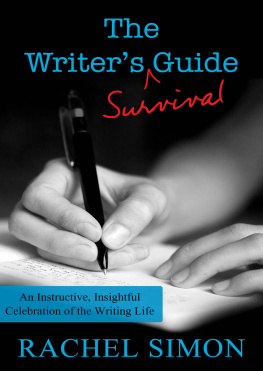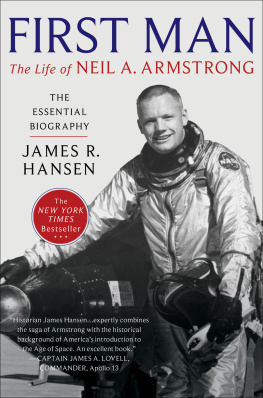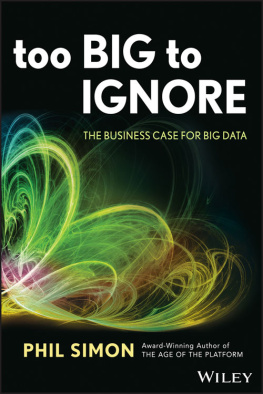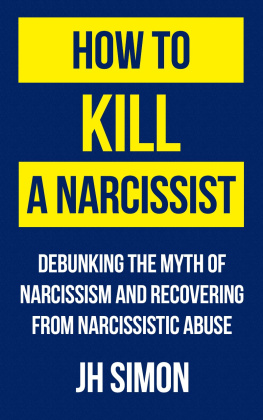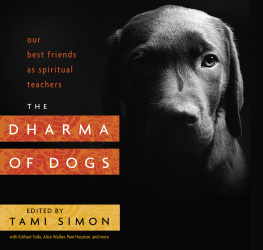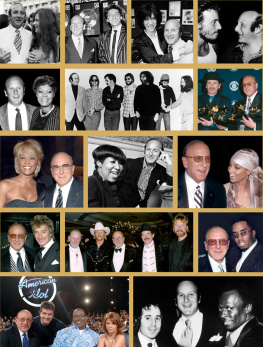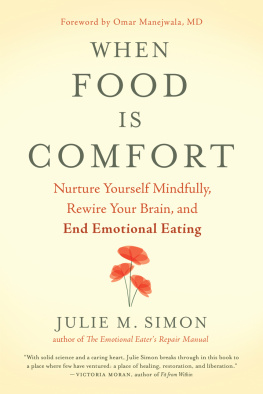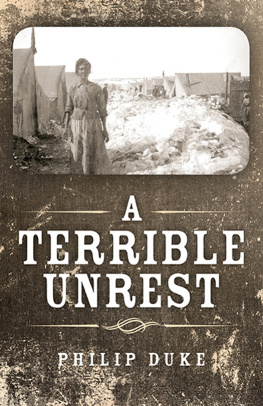The Writers Survival Guide
An Instructive, Insightful Celebration of the Writing Life
Rachel Simon
For Jack Heffron,
whose kindness helped me see through,
and for Deborah Cors,
facilitator of phoenixes
CONTENTS
INTRODUCTION
I was seven when I decided to be a writer. My moment of revelation came when I was lying on the sofa in our dining room, curled beside my mother as she took her afternoon nap and I, supposedly, napped too. But instead of sleeping, I occupied myself with my usual antinap activity, which consisted of trying to create pictures out of the cracked paint in the ceiling while I contemplated my future. I had long since tired of grown-ups asking, And what are you going to be when you grow up? Many were the arbitrary replies I had given: ballerina, teacher, mommy. But I knew in my heart that none of these was true, so I struggled to come up with a more genuine response. That afternoon, as the sun settled on top of us and the house sighed deeper into its foundation, the answer finally came to me: Aha! Ill be a writer! Somehow I knewin spite of having written nothing but alphabet exercises so far in my lifethat this was not a lie.
I thought, Ican do that.
But I had no idea what it meant to be a writer. I imagined it meant writing, pure and simple. You came up with stories, penciled them down, and then, after passing through several magic chambers, perhaps drinking a secret potion or two along the way, you found those words bound together into a book. People bought and read the book, and then you wrote another.
I began with stories and over the years added correspondence, journal writing, poetry, lyrics, and novels. I loved coming up with narratives, transcribing dialogue from my mind to the page, making my friends giggle or grow plaintive after reading my work. So what if I wasnt a blonde knockout or a swift-footed Mercury at the hundred-yard dash? If all my piecrusts in Home Ec flaked like aged plaster and my sculptures in Art class were so asymmetrical they kept tipping over and shattering on the linoleum? I could do something that I enjoyed enormously and everyone else respected: I could write.
But as biology extruded me from childhood into adolescence, and I discovered self-consciousness, I began to suspect that I didnt actually know what it meant to be a writer. Clearly, it meant more than penciling drafts into spiral notebooks. It also meant submitting work for acceptance, and the deeper the inevitability of submission drilled itself into me, the more my dread erupted. I just couldnt imagine sending my work away to a publisher. They (and it was an amorphous, mysterious they, vaguely resembling the panel of angelsor was it judges?at the gates to the great Hereafter) knew so much more than I did. My work couldnt possibly be good enough for them. I could never measure up. As if that fear werent crippling enough, I realizedafter a high school teacher critiqued some of my stories, sitting me down for hours in the dining hall one day and gently pointing out where I could edit eachthat being a writer meant working hard, harder than Id thought. It also meant admitting that my stories might be flawed or, as I put it to myself, wrongthat my cinematic references were too obscure to be useful, that my tendency to be unspecific about my narrators gender was confusing to the reader, that the words I used to describe the schizophrenic hippie candlemaker were more intellectual than a hippie voice should allow.
So something was wrong with my stories. I understand, I muttered to the teacher, slouching with embarrassment, gulping back my shame, because at that very moment, I was making the fatal leap: Having something wrong with my work, I erroneously thought, meant admitting that something was wrong with me. Egregiously wrong. Wronger than anyone elses wrong, particularly anyone bold (and talented!) enough to call herself a writer. Wrong enough to quit.
So I quit. Clearly, I wasnt worthy of being a writer.
And for six years I did not scribble another piece of fiction.
I now know that this writers block, as with all writers blocks, was also connected to my self-image, which was undergoing seismic upheaval at the time. But my fears about being a writer were genuine and, as I would later discover, similar to fears felt by all writers in the early stages of their development: I cant, ergo Im not, ergo I shouldnt.
Only years later, after I returned to writing, did I come to understand that being a writer means much more than putting words on a page. Being a writer means pushing yourself up against your emotional limits, and then pushing through. Being a writer means confronting your psychological shortcomings, and continuing in spite of them. Being a writer means continually facing hoops of fireeverything you feel about yourself and think about the worldand, after a moment to assess them and determine the angle of your trajectory, launching yourself through, maintaining the faith that you will land safely.
This lesson took me years to see. And it has only been reinforced as I have become a professional writer and teacher:
The biggest impediment to writing is not friends or teachers or editors or anything else external. Not the other stars in the classroom, nor your eye-rolling wife, nor the denouement that wont get done, nor even the editor who wouldnt buy or promote your book. The biggest impediment to writing is you.
That means your emotions, your beliefs, your defense mechanisms, your conflicts, your self-image, your ability to handle practical decisions, and everything else that goes into making you believe you cant, or arent, or shouldnt.
Indeed, being a writer means experiencing the whole emotional shebang, from misery to bliss, and becoming intimate with every emotionthe good, the bad, and the glorious. And it means coping with all the associated dilemmas of a writing life, from how to make time when it means you have to say no to your loved ones, to how to remain productive when your best story keeps getting rejected, to how to decide whether to enter a writing program when youre too scared, to how to support yourself as a writer when you dont have a trust fund.
In all my years of writing and teaching, Ive seen many talented writers throw in the towel, and seldom is their discontinuance due to an impasse with craft or even the publishing industry. Standards we can teach ourselves, technique we can practice, and publishing troubles dont necessarily cause the ink in our pens to dry.
Instead, when writers stop writing, it is almost always because of such things as competitiveness with talented others who are sharing not just the workshop table but also the admiration of the teacher; envy toward more prolific authors whose dust jackets simply must bear the subliminal message Buy me; frustration that our exquisitely original voice keeps mating itself to lackluster, clichd narratives and endings that fizzle; shame over taking three whole months on a story when our co-workers keep saying, Its not done yet?; paranoia over Uncle Mervs withdrawing the invitation to Thanksgiving after he recognizes that he was the model for the nefarious clockmaker with the cackle and downy mole.
This book was written to help writers live the writing life and understand what that means. By weaving my own stories with the stories of others, I present the whole writerly journeywhat writers can expect to feel, when in the process they can expect to feel it, and specific advice on how they might make all their emotions work for them, whether those emotions are positive or negative. I also present all the major practical decisions writers have to makefrom setting up when and where to write, to deciding how to educate oneself, to handling criticismand again, I offer specific advice.

